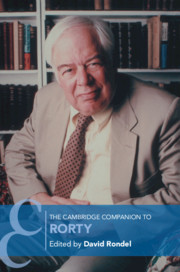Book contents
- The Cambridge Companion to Rorty
- Cambridge Companions to Philosophy
- The Cambridge Companion to Rorty
- Copyright page
- Contents
- Contributors
- Abbreviations of Works by Rorty
- Introduction: The Unity of Richard Rorty’s Philosophy
- 1 Rorty’s Metaphilosophy: A Pluralistic Corridor
- 2 After Metaphysics: Eliminativism and the Protreptic Dilemma
- 3 Rorty and Classical Pragmatism
- 4 A Pragmatism More Ironic Than Pragmatic
- 5 Rorty and Semantic Minimalism
- 6 Returning to the Particular: Morality and the Self after Rorty
- 7 Rorty’s Political Philosophy
- 8 Tinkering with Truth, Tinkering with Difference: Rorty and (Liberal) Feminism
- 9 Rorty’s Insouciant Social Thought
- 10 Rorty and National Pride
- 11 Rorty on Religion
- 12 Rorty: Reading Continental Philosophy
- 13 Rorty’s Literary Culture: Reading, Redemption, and The Heart’s Invisible Furies
- 14 Wild Orchids
- Bibliography
- Index
- Cambridge Companions to Philosophy
2 - After Metaphysics: Eliminativism and the Protreptic Dilemma
Published online by Cambridge University Press: 13 April 2021
- The Cambridge Companion to Rorty
- Cambridge Companions to Philosophy
- The Cambridge Companion to Rorty
- Copyright page
- Contents
- Contributors
- Abbreviations of Works by Rorty
- Introduction: The Unity of Richard Rorty’s Philosophy
- 1 Rorty’s Metaphilosophy: A Pluralistic Corridor
- 2 After Metaphysics: Eliminativism and the Protreptic Dilemma
- 3 Rorty and Classical Pragmatism
- 4 A Pragmatism More Ironic Than Pragmatic
- 5 Rorty and Semantic Minimalism
- 6 Returning to the Particular: Morality and the Self after Rorty
- 7 Rorty’s Political Philosophy
- 8 Tinkering with Truth, Tinkering with Difference: Rorty and (Liberal) Feminism
- 9 Rorty’s Insouciant Social Thought
- 10 Rorty and National Pride
- 11 Rorty on Religion
- 12 Rorty: Reading Continental Philosophy
- 13 Rorty’s Literary Culture: Reading, Redemption, and The Heart’s Invisible Furies
- 14 Wild Orchids
- Bibliography
- Index
- Cambridge Companions to Philosophy
Summary
Where contemporary thinkers well disposed towards Rorty tend to emphasize the significance of Contingency, Irony and Solidarity, more skeptical voices are apt to impugn his relevance to ongoing debates in philosophy on the grounds that that work’s attempt to dispose of the traditional conception of the discipline in the name of a nebulous “literary criticism” is little more than an exercise in self-therapy. The contention of this chapter, then, is that the antagonism this emphasis generates is both unfruitful and ill-conceived. Taking as its starting point reactions to criticism of his early (eliminativist) materialism, it argues that Rorty’s work in the 1970s offers a vindication of the activity of traditional philosophy, albeit within the broader conception of intellectual inquiry we’ve come to call neopragmatism and – latterly – “cultural politics.” From this perspective, Contingency, Irony and Solidarity is just one (perhaps self-revealing) prophetic-theoretical proposal amongst many that neopragmatism/philosophy-as-cultural-politics makes possible. But that in turn shows how important this period of Rorty’s work is, not only to understanding his later output but also to elucidating the options available to contemporary philosophy.
Keywords
- Type
- Chapter
- Information
- The Cambridge Companion to Rorty , pp. 42 - 66Publisher: Cambridge University PressPrint publication year: 2021



